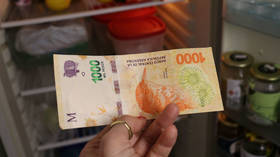Inflation in Latin American nation soars past 100%

Argentinian inflation saw an enormous year-on-year surge to 104.3% in March, marking the highest annual rate since 1991, according to data released by the National Institute for Statistics and Census (INDEC) on Friday.
The inflation-rate reading for the month came in at 7.7%, higher than the median forecast of 7% among analysts polled by Bloomberg. Economists surveyed by Reuters had provided a more pessimistic outlook of 7.1%.
Total inflation for the first three months of the year was 21.7%. In February, the inflation rate hit 102.5%, meaning the price of many consumer goods has more than doubled since the same period a year ago.
The highest increase and the biggest influence on the overall index came from the cost of education, which saw a month-on-month surge of 29.1%. The massive increase was attributed to the start of the school year.
Clothing as well as food and non-alcoholic beverages, where the hike was caused mainly by the cost of meat, dairy products and eggs, increased by 9.4% and 9.3% month-on-month respectively. Also, due to a breakout of avian flu in Argentina, prices for chicken and eggs soared over 25%.
Argentina has been among the countries with the highest inflation rates for several years in a row. Buenos Aires has long tried to contain inflation but divisions have marred the nation’s economic policy. Last summer, three economy ministers succeeded one another in the space of just four weeks as the economic crisis deepened.
In December, the International Monetary Fund (IMF) approved another $6 billion of bailout money. It was the latest payout for Argentina in a 30-month programme that is expected to reach a total of $44 billion.
For more stories on economy & finance visit RT's business section













